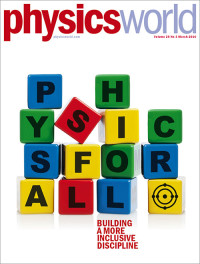By Matin Durrani
Welcome to the March 2016 issue of Physics World magazine, which is ready and waiting for you to access via our app for mobile and desktop.
The new issue looks at ways to make physics a more inclusive discipline, including spotting your unconscious bias, tuning in to talent and tackling “microaggressions” – small acts of injustice that make people uncomfortable because of who they are, not what they do.
We also look at what life’s like for gender and/or sexual minorities at CERN – one of the most international physics labs on the planet – and explore how to find an employer who understands the value of a diverse workforce. There are plenty of practical tips for how you can make a difference.
If you’re a member of the Institute of Physics (IOP), you can now enjoy immediate access to the new issue with the digital edition of the magazine in your web browser or on any iOS or Android mobile device (just download the Physics World app from the App Store or Google Play). If you’re not yet in the IOP, you can join as an IOPimember for just £15, €20 or $25 a year to get full access to Physics World digital.
 For the record, here’s a run-down of what else is in the issue.
For the record, here’s a run-down of what else is in the issue.
• LIGO opens new window on universe – Tushna Commissariat finds out just how far-reaching the consequences of last month’s gravitational-wave discovery will be, following the decades-long hunt for ripples in space–time
• Is physics just for the rich? – Aaron Iftikhar says that better teaching can prevent physics from being a subject mainly for the well off
• Diversifying utopia – Robert P Crease notes a remarkable absence at the heart of Francis Bacon’s 17th-century vision New Atlantis
• Where people and particles collide – What’s it like to be in a gender or sexual minority at CERN, one of the most multicultural labs on the planet? Louise Mayor reports
• Surely you’re not biased – Physics World editor Matin Durrani thinks he’s not biased. But in an eye-opening journey of self-discovery, he finds that the truth is very different for him – and for all of us
• A thousand tiny cuts – Margaret Harris explores how small, subtle and sometimes subconscious actions can add up to create an environment that feels unwelcoming – or even hostile – to women and other under-represented groups in physics
• How to tune in to talent – What can we do as individuals to make physics a more inclusive environment? Jenni Dyer shares her top five tips
• Finding a welcoming employer – Alaina G Levine outlines strategies to help graduates find employers who understand the value of a diverse workforce
• Building a leaky pipline – Bill Gott takes a tongue-in-cheek look at how to turn people off physics
Trackback: The Faith and Fables of Thunderfoot | Symptoms Of The Universe